Keep up to date with the latest news and views on cultural heritage events.
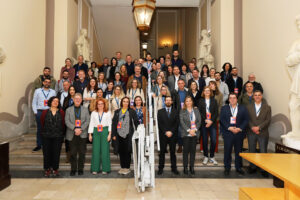
HUB-IN Final Conference: Innovation Meets Cultural Heritage in Cities
Last week, Heritage Europe attended the HUB-IN Final Conference, ‘Innovation Meets Cultural Heritage in Cities’, in Lisbon, Portugal.
Joined by cities and partners across Europe, participants had the opportunity to explore how Hubs of Innovation can unlock sustainable regeneration of Historic Urban Areas and align with the goals of the New European Bauhaus.
From expert discussions to hands-on workshops and site visits, the exciting programme of events was both a celebration of four years of hard work and the start of a new journey through the HUB-IN Alliance and HUB-IN Academy.
Read more about the conference here and join the HUB-IN Academy and Alliance here.

Co-designing Digital Services for Sustainable Cultural Heritage Buildings
Join the workshop to provide feedback and recommendations about the digital services for the management of cultural heritage buildings offered by INHERIT.
Following up on the first workshop held in May 2024, INHERIT project launches the new “Co-designing Digital Services for Sustainable Cultural Heritage Buildings – Round 2” workshop.
This workshop aims to brainstorm and refine user flows and the user experience design for the INHERIT digital services.
Participants will get insights into the features supported by the 10 services developed by the project and have the chance to offer feedback and recommendations on the most effective designs.
Date: 13/12/2024
Time: 12:30 – 14:00 (CET)
Location: Online – MS Teams
Form for registrations: https://forms.office.com/e/c5cw7kydxR
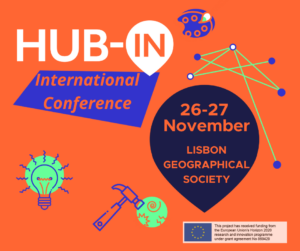
HUB-IN International Conference
26-27 November 2024
Rua das Portas de Santo Antão, 100 1150-269 Lisboa, Portugal
We are pleased to announce the HUB-IN International Conference. Heritage Europe have been a key partner on this exciting project since 2020.
Join us in Lisbon to discover how innovation hubs can drive economic revitalisation, tackle climate challenges, preserve cultural heritage, and enhance social inclusion!
🔶 Get inspired by keynote speakers
🔶 Exchange ideas with peers
🔶 Learn from HUB-IN’s pilot cities’ experiences
🔶 Network with like-minded people from all over Europe
HUB-IN Consortium Meeting in Brasov
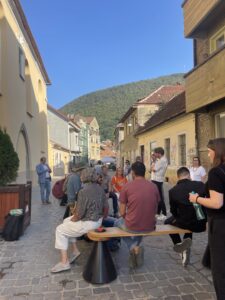
Last week, members of the Heritage Europe team attended the penultimate HUB-IN Consortium Meeting in Brasov, Romania.
Partners and pilot cities came together to discuss the project’s results and alignment with European policy, amongst other topics.
The meeting was also an excellent opportunity to explore Brasov, one of the eight pilot cities in the HUB-IN project.
Read more about what the team got up to here: HUB-IN Consortium Meeting in Brasov – Heritage Europe (historic-towns.org)
 UPDATE 2024
UPDATE 2024
After 4 exciting years, the EU-funded HUB-IN project is putting plans into action.
Our 8 pilot cities are implementing different initiatives to transform their Historic Urban Areas (HUA) into HUBs of innovation and entrepreneurship.
By promoting artistic projects, preserving their unique cultural heritage, and fostering the development of original, sustainable businesses, our cities strive to become vibrant places to live in! Watch the video to discover more!
 INTRODUCING INHERIT
INTRODUCING INHERIT
INHERIT is an EU-funded project aimed at promoting energy and resource efficiency, sustainability, resilience, and inclusiveness of cultural heritage buildings.
The preservation and renovation of European historic buildings can be difficult given the diverse range of materials and architectural styles. But renovating existing buildings to be more climate friendly could potentially reduce the EU’s energy consumption by 5-6%.
INHERIT’s overall vision is to co-design, develop, demonstrate, validate and replicate next generation solutions for sustainable, inclusive, resource-efficient and resilient Cultural Heritage. The project will:
- Be accompanied by leading-edge Information and Communication Technologies (ICTs), such as Internet of Things (IoT), Artificial Intelligence (AI) and (big) data analytics
- enable socially innovative and cost-effective interventions at different urban levels (buildings and city/neighbourhood)
- cover all relevant aspects of the heritage-built environment’s life cycle: (1) Design and renovation; (2) Monitoring, operation and management; (3) Preservation and maintenance.
Heritage Europe is part of a consortium of organisations led by Singular Logic and will be contributing to the programme’s dissemination and exploitation. The project will be developed and tested in historic buildings located in Croatia, France, Greece, Latvia, Poland, Spain, Sweden, and Turkey.
We’ll be sharing information about the project throughout its development and expect the final guidance to be produced in early 2027.
HUB-IN WANTS YOU!
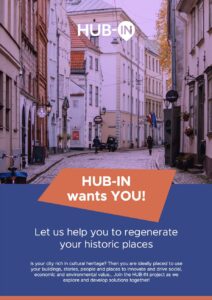 The HUB-IN project, of which Heritage Europe is a key partner, is offering the opportunity for other historic places to both share their experience of heritage-led innovation & entrepreneurship, and contribute to and learn from the HUB-IN approach being developed – no matter what stage they are at in delivering sustainable regeneration.
The HUB-IN project, of which Heritage Europe is a key partner, is offering the opportunity for other historic places to both share their experience of heritage-led innovation & entrepreneurship, and contribute to and learn from the HUB-IN approach being developed – no matter what stage they are at in delivering sustainable regeneration.
This wider pool of cities will act as a community of interest to help develop HUB-IN and begin to create an ongoing Alliance of hubs of innovation that will help build the legacy of the project.
You can read more about the opportunity and register your interest on the HUB-IN website
NEW ATLAS OF GOOD PRACTICE
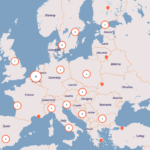 The HUB-IN project, of which Heritage Europe is a key partner, is pleased to launch an Atlas of good practice on the regeneration of historic urban areas through entrepreneurship and innovation. It brings together dozens of examples from cities across Europe to inform, influence and inspire other heritage led regeneration projects. It can be found here
The HUB-IN project, of which Heritage Europe is a key partner, is pleased to launch an Atlas of good practice on the regeneration of historic urban areas through entrepreneurship and innovation. It brings together dozens of examples from cities across Europe to inform, influence and inspire other heritage led regeneration projects. It can be found here
You can search the Atlas for cases that exemplify good practice across a variety of city size, type of heritage, scale, budget and location or around themes such as the circular economy, social inclusion and smart cities. Further resources and information from HUB-IN can be found here.
NEW GUIDE TO BUSINESS, FINANCING & GOVERNANCE MODELS FOR HERITAGE-LED REGENERATION
 As part of the HUB-IN project, a new guide to business, financing and governance has been launched. This guide will provide you with a state of the art overview of business, financing and governance models, relevant to the heritage-led regeneration of Historic Urban Areas.
As part of the HUB-IN project, a new guide to business, financing and governance has been launched. This guide will provide you with a state of the art overview of business, financing and governance models, relevant to the heritage-led regeneration of Historic Urban Areas.
The business, financing and governance model cases presented in this guide provide insights into the ways these models are being used throughout Europe to enable heritage-led regeneration. The guide provides a starting point for exploring the many funding and financing opportunities that are present today. You can find the guide at https://hubin-project.eu/library/business-financing-governance-models-for-heritage-led-regeneration/.
HERITAGE EUROPE BECOMES OFFICIAL PARTNER OF NEW EUROPEAN BAUHAUS (NEB)
Heritage Europe is delighted to become one of the official partners of the New European Bauhaus (NEB) as of May 2021. Announced by Ursula Von der Leyen, President of the European Commission in her State of the Union address in September 2020, the New European Bauhaus initiative ‘connects the European Green Deal to our daily lives and living spaces. It calls on all Europeans to imagine and build together a sustainable and inclusive future that is beautiful for our eyes, minds, and souls.’ It therefore acts as a key delivery mechanism for a future Europe in which design and architecture is central to addressing the social, economic and environmental challenges of the 21st Century, as the original Bauhaus did in the 20th Century.
As one of the official partners, Heritage Europe is part of a community that is co-creating the initiative, identifying opportunities and ideas, and working with citizens. Our first contribution to the design phase is the paper ‘Tomorrow’s Heritage’ which you can read here.
Further information about NEB and the role of partners can be found here
NEW PROJECT LAUNCHES
HUB - IN , a Horizon 2020 project launches with its kick off meeting/ workshop on the 30th September, followed by a further 2 half-day workshops for the project partners on the 1st and 2nd of October. Heritage Europe is one of the partners in this 18 partner consortium from acro
The workshop Hubs of Innovation and Entrepreneurship for the Transformation of Historic Urban Areas, inaugurates and celebrates the beginning of a “journey” that will be carried out by the HUB-IN project, over the next four years. This workshop is open to a broad European and international community involved in urban transformation processes, with a focus on historic areas. We expect the attendance and participation of policy makers, academia, NGO´s, SME´s and potential follower cities across Europe.
During our one day “journey” the participants will have the opportunity to debate the transformation processes of historic urban areas, to talk with the HUB-IN project team, to gain knowledge listening to European Commission experts, to find inspiration listening to our invited keynote speaker. During the day, the participants will find interactive moments to participate in several types of activities including informal network, debates, inspirational moments, and collaborative sessions to share idea
Welcome to the HUB-IN “journey” and seize the day!
Guidelines for Sustainable Cultural Tourism – “A Unique Opportunity for Change Post Covid -19”
Joint paper authored by Brian Smith (Heritage Europe) and Matthias Ripp (Organisation of World Heritage Cities)
‘We see the key leadership role in securing more sustainable cultural tourism as falling, in large part, to historic towns and heritage cities.These guidelines show how decision makers can assess their current approach and begin to scope a clear plan of action for a better, more sustainable and resilient future. The Covid 19 pandemic presents them,and all of us, with a once in a life time opportunity to rise to that challenge and ensure the pandemic cloud can indeed have a silver lining.’
Click here to read the full document
NEW EUROPA NOSTRA PAPER: COVID-19 & BEYOND
OCTOBER 17, 2020
On Wednesday 14 October, during a meeting of the European Commission Expert Group on Cultural Heritage, Europa Nostra presented a new paper: “COVID-19 & BEYOND: Challenges and opportunities for cultural heritage”.
Since the very outbreak of the COVID-19 pandemic, Europa Nostra has been working to identify specific impacts of the crisis on cultural heritage sites and stakeholders, including by holding virtual conversations with members and partners, as well as through a meeting of the European Heritage Alliance.
Download and read the paper here.
EHA 3.3 Manifesto launched
European Heritage Alliance Manifesto ‘Cultural Heritage: a powerful catalyst for the Future of Europe‘, was launched on 9 May and presented to EU leaders prior to the EU Council meeting in July
The European Heritage Alliance Manifesto puts forward 7 interconnected ways in which cultural heritage can be a positive catalyst for change and contribute to shape a better and more prosperous future for our continent.
At a time when Europe is struggling to overcome an unparalleled crisis caused by the COVID-19 pandemic, the cultural heritage world can and should contribute to Europe’s recovery and revival because our cultural heritage is not only the foundation of our shared history and memory, but also a solid bridge between our past, our present and our future
The Manifesto is available in 13 languages and has been signed by over 700 prominent signatories and heritage supporters (full list here). If you haven’t done it yet, we encourage you to read, sign and share this important Manifesto.
Findings on the consultation on the impact of COVID-19 on the heritage world to be released in September
Deeply concerned about the massive negative impacts of the COVID-19 pandemic on the cultural heritage world, Europa Nostra launched on 26 March a consultation on this topic among its large pan-European network of members and partners. Europa Nostra has already communicated important information and initial observations on the specific impacts of the COVID-19 pandemic on the heritage sector to the European Commission, via the Commission Expert Group on Cultural Heritage.
In total, some 40 extensive responses from 20 countries in Europe and beyond were received, providing for a varied and geographically diverse overview. The vast majority of respondents are organisations, many of which represent at the same time a conglomerate of organisations with a large membership. Responses by individual heritage professionals or volunteers were also collected. Through this consultation, there is now a better and more complete understanding of the effects of the COVID-19 pandemic on the cultural heritage world, the reactions it has triggered on the ground and on the specific needs of the heritage sector to overcome this far-reaching crisis.
Horizon Europe
The European Union’s next research and innovation programme “Horizon Europe” replaces Horizon 2020 and will run from 2021 to 2027 and be worth €100 billion, according to proposals launched on 7 June by the European Commission.
The planned programme is structured around three pillars: open science, global challenges and industrial competitiveness, and open innovation. The first pillar includes funding for fundamental research and grants for research mobility and infrastructure. The second pillar groups research into five clusters: health; inclusive and secure society; digital and industry; climate, energy and mobility; and food and natural resources. The third pillar is designed to enhance Europe’s innovation output.
There is also money set aside to strengthen Europe’s research base as a whole, including a doubling of funds designed to help Member States make the most of their national research and innovation potential, and by taking measures to reform and enhance the European research and innovation system.
BREXIT – UK future participation in EU Creative Europe Programme (2021 – 2027)
With the BREXIT transition period coming to an end by the close of 2020, under the future programme, the only route that may possibly be open for UK organisations to take part in the Creative Europe Culture sub-programme, specifically Cooperation Projects, would be as a Third Country Participant.
What is a Third Country Participant?
A ‘Third Country Participant' is a project partner from outside the (currently 41) eligible countries participating in the Creative Europe programme. Third Country partners are seen as project delivery partners – they will have responsibility for specific parts of the project, but are not full project partners, and won’t have the level of accountability and responsibility as them.
For more information go to Third Country guide for UK organisations participating in Cooperation Projects from 2021 | Creative Europe Desk UK (creativeeuropeuk.eu)
Cultural Heritage recognised - at last - as cross cutting priority for the EU!
The European Year of Cultural Heritage has come to its end, having generated a wide range of initiatives and activities, as well as a new enthusiasm for cultural heritage across Europe and beyond. Importantly it has led to significant policy breakthroughs at the European level. For example:-
The Berlin Call to Action presented at the first European Cultural Heritage Summit in June has been signed to date by over 2,000 organisations and individuals -including Heritage Europe. Following which cultural heritage has been recognized as a “cross-cutting priority” within the new European Agenda for Culture and the new 4-year Work-Plan for Culture recently adopted by the EU Council has identified “sustainability in cultural heritage” as its first priority.
Finally, at the Closing conference for EYCH 2018 held in Vienna in December the European Commission presented an ambitious and holistic Framework for Action on Cultural Heritage to ensure the lasting legacy of the Year.
The implementation of this Action Plan will benefit from the setting up of a future Cultural Heritage Forum which will serve as a multi-stakeholder platform for consultation, exchanging of ideas and best practices and for promoting adequate public policies. Thanks to the joint commitment of all stakeholders, public and private, we now have a forward-looking roadmap ahead of us.
The European Heritage Alliance 3.3, of which Heritage Europe is a founding member, can take satisfaction from these outcomes which closely relate to the recommendations set out in its earlier research report ‘Cultural Heritage Counts for Europe’ and reflects the significant role the Alliance and its members have played in raising awareness and mobilising activities and events throughout 2018. The Alliance coordinator -Europa Nostra – has an upbeat message for all of us -
‘to continue building lasting bridges and partnerships and to step up our efforts in 2019 and beyond. In this way, we can be confident that the new European Parliament and the new European Commission will sustain the momentum and build upon the significant achievements of our European Year of Cultural Heritage.’
|
